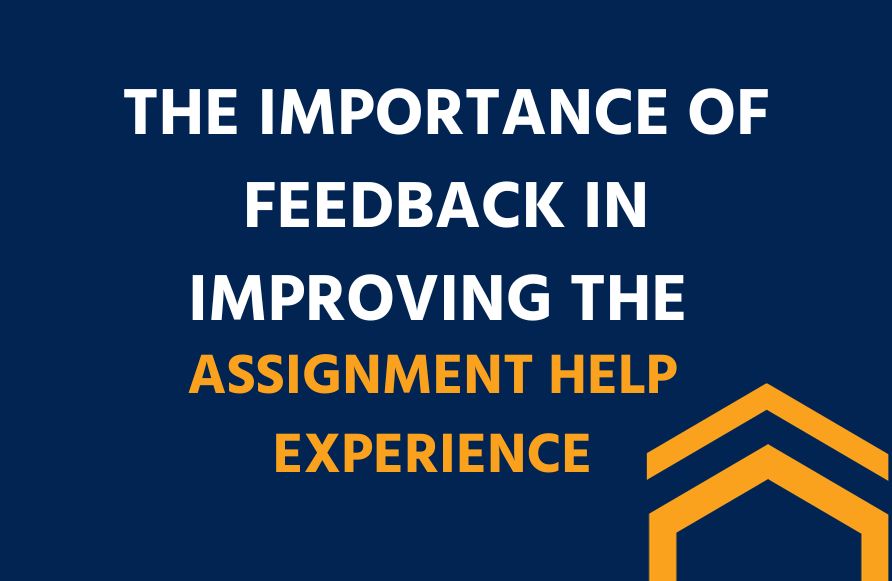The Importance of Feedback in Improving the Assignment Help Experience

Students who require assistance with assignments and coursework can turn to assignment help services for academic support. Feedback is important since it offers a way to keep improving, guaranteeing the calibre and efficacy of these services while also improving students’ overall educational experience.
The Significance of Positive Criticism
- Goals of Constructive Feedback– The process of providing targeted, actionable information to individuals or entities for promoting growth and development is through giving constructive feedback. When it comes to assignment help services, its goal is to give students and service providers a clear picture of their areas of strength and improvement so that they can go forward and improve the aid they offer.
- Feedback as a Two-Way Communication– Good feedback promotes a two-way conversation between students and assignment assistance providers. It is not a one-way procedure. It entails offering remarks and recommendations in addition to paying attention to and considering the viewpoints and worries of the other person. This two-way communication is essential to fruitful interactions in the educational support process because it promotes cooperation and understanding between parties.
- Elements for Effective Feedback– Some essential components make constructive feedback effective. It needs to be detailed and address specific elements of the task or service. It must be practical and offer pointers for getting better. It should also be timely and provided in a way that makes it possible for immediate or pertinent application. To foster a environment that promotes progress rather than discourages it, feedback should also be courteous and encouraging. Together, these components strengthen the assignment assistance experience and allow service providers and students to aim for excellence and ongoing development.
The Advantages of Student Feedback
- Empowerment and Engagement– Giving students feedback gives them the ability to take charge of their education by giving them information about how they are doing academically. As kids learn about their talents and shortcomings, it promotes active participation in their homework and tasks. Students can develop a sense of accountability for their academic development by using constructive criticism to pinpoint areas for growth, create goals, and make well-informed decisions.
- Better Learning Experience– Receiving constructive criticism makes a big difference in how well students learn. It directs students toward a deeper comprehension of the material while also assisting them in fixing errors. Students who receive feedback on how to make their assignments better might enhance their critical thinking and problem-solving skills as well as gain a deeper understanding of the course subject. This results in a learning process that is more successful and rewarding.
- Accountability and Transparency– By making students and assignment assistance providers accountable for their parts in the learning process, feedback encourages accountability. Feedback emphasizes to students the value of achieving deadlines and academic requirements, which strengthens their sense of accountability. Additionally, feedback makes the evaluation process more transparent by guaranteeing that expectations and grading standards are precise and consistent. Students and service providers develop trust as a result of this transparency, which creates a supportive environment where students can feel confident in receiving an impartial evaluation.
Advantages of Feedback for Companies That Offer Assignment Help
- Ongoing Enhancement
- To continuously improve the calibre of their services, assignment assistance providers can benefit greatly from receiving feedback. These providers can determine areas in need of improvement and implement well-informed modifications by gathering and examining student feedback.
- Through this iterative process, they can stay well-informed of the most recent pedagogical developments, adjust to changing educational demands, and improve the support tactics they offer to their clients, all of which contribute to their ability to serve them more effectively.
- Establishing Credibility and Trust
- Efficient feedback channels facilitate the development of credibility and trust in the assignment assistance sector. Service providers earn the trust of students when they show appreciation for and consider the input provided by the students.
- Long-term partnerships are built on this trust, which reassures students that their academic demands are taken care of. Assignment assistance suppliers can create a strong reputation and position themselves as trustworthy and respected educational partners as their credibility and trustworthiness increase.
- Customer happiness and retention
- For companies offering assignment assistance, customer satisfaction is a crucial metric of success. Through feedback mechanisms, providers can determine the degree of client satisfaction. Providers can raise customer satisfaction by responding to complaints and making the required adjustments in light of input.
- Students who are happy with the service are more inclined to refer it to others and come back for more help. This ultimately results in increased client base growth, retention rates, and overall profitability for companies offering assignment assistance in a cutthroat industry.
Examining and Responding to Feedback
- Data Gathering and Analysis– Strong data-gathering procedures are the foundation of an efficient feedback analysis. Providers of assignment assistance must employ various tools and methods, including questionnaires, surveys, and face-to-face interactions, to gather input. Once they gather data, conducting thorough analysis is crucial. To find recurring themes, emerging trends, and particular problems, this entails classifying and combining input. Providers can obtain a thorough hold of areas that require development and strengths that should be preserved by measuring and qualifying the comments.
- Making Changes– Following in-depth data research, companies that offer assignment assistance ought to move forward with making the required adjustments and enhancements. Collaboration amongst various stakeholders, including educators, administrators, and support personnel, is necessary for this phase. A strategy, policies, and resource allocation should change in response to input. Providers need to make clear, practical adjustments, whether by updating training materials, optimizing support systems, or changing the way services are delivered.
- Tracking Progress– To evaluate the effects of changes and determine their efficacy, it is imperative to establish ongoing feedback loops. Assignment assistance suppliers ought to keep an eye on things by cross-referencing fresh feedback with past data. They can ascertain whether the improvements that have been put into place have enhanced the experience of students and addressed concerns due to this continuous review. To maintain the provider’s flexibility and responsiveness to changing student needs, additional modifications may be made if needed in response to later input.
Summary
Feedback is essential for improving the assignment assistance experience. In addition to encouraging responsibility and continual improvement for both service providers and learners, it empowers students. Providing improved educational support and cultivating an excellent culture can help the assignment assistance ecosystem flourish when it gives critical feedback.



